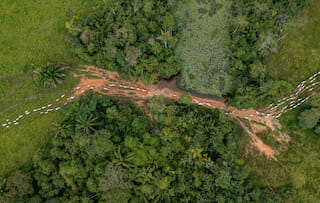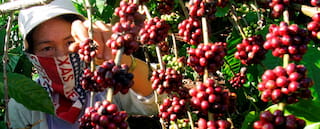IDH at COP30

The 30th UN climate conference will take place from 10-21 November 2025 in Belém, Brazil.
It will bring together world leaders, non-governmental organisations, and civil society to discuss priority actions to tackle climate change.
To inspire change, IDH, together with its partners, will share, during different events and meetings, existing best-practice programs on climate adaptation and mitigation from commodity sectors around the world.
Read more about our (co-hosted) sessions further down on this page, and please fill in this expression of interest to join one or more of the sessions.
Are you attending COP30? Please let us know at COP30@events.idhtrade.org.
Examples include:
Brazil beef
IDH has been working in Brazil to promote the sustainable use of land, fostering the production of deforestation-free food crops, initiatives for the restoration of degraded areas and the inclusion of smallholders in value chains. Through a landscape strategy in different regions of Brazil, IDH is bringing together actors from the government, civil society, the private and productive sectors. Allied to this is a program focused on transforming the livestock chain with results in territorial sustainability, business practices at sector level and innovation at farm level.
Vietnam coffee & spices
A decade-long effort has created a more resilient landscape that scales regenerative agriculture, protects forests, and delivers measurable and EUDR compliant carbon reductions across hundreds of thousands of farms. This working model is already inspiring replication in India, Indonesia and Uganda.
Colombia coffee
Since 2020, this multistakeholder landscape approach in Colombia’s largest coffee-producing region has successfully set joint long-term commitments on sustainable production, environmental protection, and social inclusion. In 2025, an additional study has been conducted to operationalise a supply shed insetting approach that channels climate finance directly into coffee-producing landscapes.
India cotton & food crops
The Regenerative Production Landscape (RPL) Collaborative is an innovative jurisdictional model being implemented in Madhya Pradesh, India to foster agricultural ecosystems that conserve and enhance natural resources and build community resilience whilst enabling businesses to source responsibly.
Uganda coffee
Building capacity for compliance in the coffee sector. In 2024, IDH collaborated with key partners in the Ugandan coffee industry to prepare for compliance. Partnering with the Uganda Coffee Development Authority and Café Africa, IDH helped design a national action plan aligned with EUDR and CSDDD requirements. Efforts include awareness campaigns and the integration of advanced traceability technology into existing farmer networks, such as the Uganda Coffee Farmers Alliance (UCFA).
Malaysia palm oil
IDH is working in collaboration with the Ministry of Plantation and Commodities and the Malaysian Palm Oil Board to meet EUDR requirements. In 2024, a program was piloted to build mapping efforts and improve traceability for smallholders through the National Initiatives for Sustainable and Climate-smart Oil Palm Smallholders. Leveraging the mandatory Malaysian Sustainable Palm Oil (MSPO) certification framework, the project works towards building smallholder inclusion models with assurance by MSPO on deforestation and legality compliance at a landscape level. Once successfully piloted, the project aims to expand the model to all 162 Sustainable Palm Oil Clusters managed by the Malaysian Palm Oil Board nationwide, ensuring long-term compliance and resilience in the palm oil sector.
Where are we?
10 November - Solving the decarbonisation challenge: Collective Action for decarbonisation of commodity supply chains
- 10 November, 11:20 – 12:35 BST
- AgriZone; Auditório A2 | Auditorium A2
- No badge zone, free entry
Climate change is already reshaping many landscapes. For example, up to 50% of suitable coffee land could be lost by 2050 if urgent action is not taken. Brazil, home to the Amazon and one of the world’s most important agricultural regions, is projected to experience 214 more days of heat waves per year by the 2090s, threatening production and livelihoods. Across the tropics, the consequences are already visible: erratic rainfall, soil degradation, and declining yields are undermining farmer incomes and threatening supply security. For global companies, this means that climate resilience has become a business issue, not just a sustainability one.
Companies must mainstream sustainability across every part of the value chain. Not as a cost centre, but as a foundation for long-term security, compliance, and growth. Industry leaders reaffirmed this at London Climate Action Week and more recently during New York Climate Week, highlighting several key insights that now shape how the sector approaches collective climate action.
At COP30, IDH brings this topic to the agenda. Together with partners, we will demonstrate how taking action at supply shed scale on climate adaptation and scope 3 decarbonisation can become a driver of shared prosperity and landscape resilience.
11 November - Beyond Supply: Building value chains through landscape partnerships
- 11 November, 11:20 - 12:35 BST
- AgriZone; Auditório A4 | Auditorium A4
- No badge zone, free entry
Croplands and grazing lands cover a third of the earth’s land surface. A landscape approach is fundamental to sustainability and food security, as it integrates food production with the territory, local culture and environmental preservation. This approach considers not only production itself, but also the connection between food, people and the nature in which it is produced, promoting more resilient and just food systems. It is important because it recognises the complexity and interdependence of food systems, seeking solutions that integrate environmental, social and economic dimensions.
To address challenges, several joint investments in production landscapes have been made over the last few decades, providing a model for achieving significant transformation at the landscape level through collaboration between value chains. Large companies are already committed to sustainable sourcing, but the challenges of transforming commodity production in a way that supports positive outcomes for people, nature and the climate remain.
To inspire change, IDH, together with its partners, will share existing programs around the globe on food production under the landscapes approach, covering 18 landscapes in 11 countries across 3 different continents. IDH’s goal is to protect and restore 5 million hectares of vulnerable landscapes by 2030 through integrated solutions to global challenges. We do this by addressing landscape degradation through local livelihoods, targeting activities in producing countries as well as at the global market level.
During the session, we will demonstrate how the landscape approach to food production is effective by considering the participation of diverse actors, including farmers, governments and companies. These partners are building fairer, healthier and more sustainable food systems by recognising the complexity of landscapes, seeking solutions that integrate environmental, social and economic dimensions.
13 November - Delivering on food system climate finance: Value for farmers, impact for the planet
- 13 November, 16:30 - 17:30 BST
- Action on Food Hub, Pavilion PVE 156
- Co-hosts: SNV, CA4SH, Environmental Defense Fund (EDF), IDH
Global food systems must transform to meet the challenges of a changing climate and build resilience for farmers and communities. Yet, the finance and support needed to enable this transformation isn't reaching the farmers who produce our food.
This roundtable session will identify practical, scalable mechanisms that strengthen resilience, enhance climate outcomes, and deliver tangible value to producers.
Building on emerging evidence and partner experience, the session will:
- Highlight the financing needs and barriers to scaling resilience-focused approaches, especially for smallholders and other producer segments.
- Showcase solutions and mechanisms that reduce investor risk and incentivise adoption of climate-smart and resilience-building practices (including soil health and enteric methane abatement).
- Foster dialogue among funders, implementers, and farmer representatives to codesign pathways that translate commitments into action.
15 November - Innovation and productive inclusion in sustainable livestock farming
- 15 November, 12:30 – 13:30 BST
- Green Zone; Belém+10
- Co-hosts: IDH, WWF, iCS
This session will foster a high-level dialogue on the socio-environmental opportunities of sustainable intensification in cattle farming, exploring innovative pathways to accelerate its adoption. It will highlight how intensified production can go hand in hand with the recovery of degraded pastures, increased productivity and income, and a just transition towards more resilient agricultural systems. Bringing together policymakers, financial institutions, civil society organisations, and field practitioners from Brazil and across Africa, the event will showcase concrete experiences, challenges, and solutions that align productivity, income generation, emissions reduction, and climate resilience.
Speakers include:
- Manuela Santos - Executive Director of IDH (moderator)
- Frederico Machado - Manager of the Land Use Transition, Food Systems and Bioeconomy Axis at iCS
- Phomolo Maphosa - SNV, Director East and Southern Africa Countries
- Tiago Lima - National Service for Rural Extension Pará
- Pedro Cunto - Special Advisor at the Ministry of Agriculture, Livestock and Supply, responsible for the Green Way project
- Lais Ernesto Cunha - WWF, Responsible Agriculture Leader
19 November - Environmental compliance: Multilateral partnerships focused on producers to accelerate action
- 19 November, 9:30 – 10:30 BST
- Pará Pavilion
- Co-hosts: IDH, TNC, Solidaridad, SEMAS-PA
The state of Pará in Brazil faces, proportionally, major challenges and opportunities related to land use and occupation. In 2023, the state government launched the Sustainable Cattle program of Pará, which increased the urgency and complexity of promoting environmental compliance among smallholders.
As part of this strategy, IDH, The Nature Conservancy (TNC), and the Government of Pará established a partnership to implement the Producer and Breeder Support Hub (NAP), which provides free services for environmental regularisation, commercial requalification (commercial unlocking), and access to animal traceability in priority territories across Pará.
During this event, speakers will discuss how the NAP model represents an innovation in territorial implementation, supporting the rollout of public policies to address the climate crisis by providing direct assistance to producers, promoting traceability, environmental compliance, and productive inclusion.
The event will bring together representatives from the Government of Pará (SEMAS), IDH, TNC, Solidaridad, and COGES, who will present preliminary results and discuss challenges and opportunities to scale the model to other Amazonian territories.

